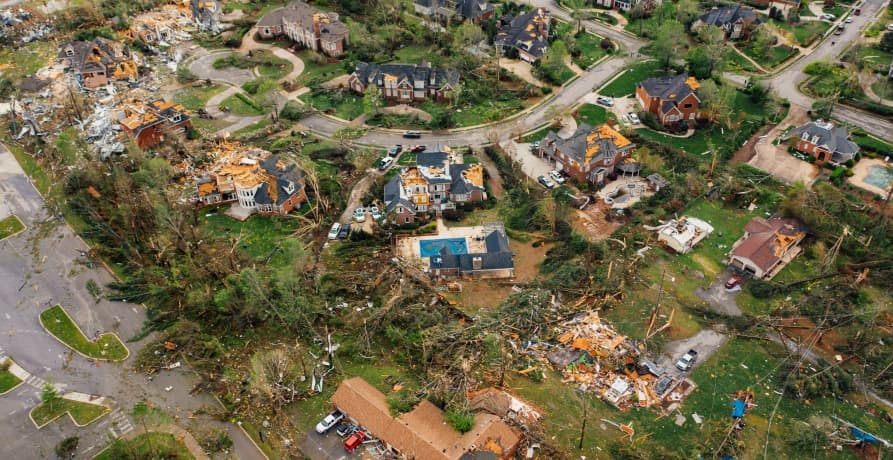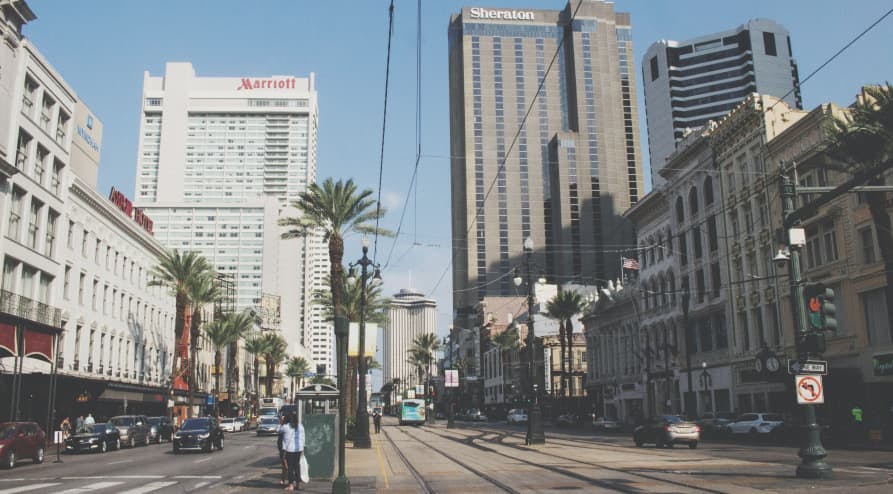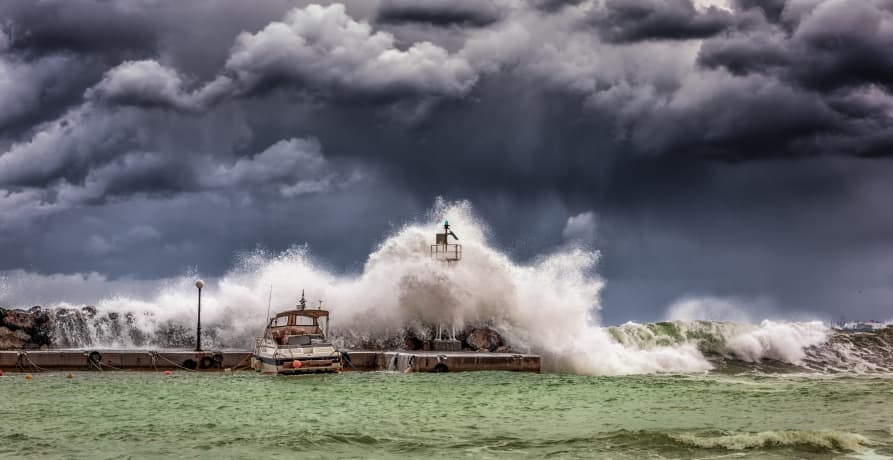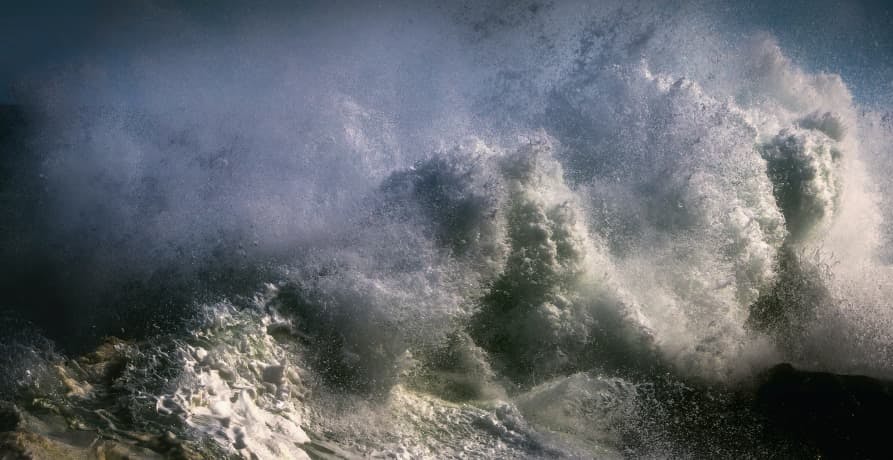ESG / CSR
Industries
How Does Climate Change Fuel a Hurricane?



Natural disasters like tornadoes, tsunamis, and earthquakes are leaving devastating effects on places around the world – and the typical hurricane isn’t shy to join that list.
Some natural disasters are linked to have increased in severity alongside climate change, and given global rising temperatures, some propose that hurricanes may be aggravated by global warming as well.
What is a hurricane, how do hurricanes form, affect society, and the biggest question of all – are hurricanes stimulated by climate change itself?
What is a hurricane?
A hurricane is a type of natural disaster, similar to a thunderstorm, that forms over subtropical and tropical waters. In the United States, a hurricane is most likely to occur in the southern states that rest alongside the Gulf of Mexico or Atlantic Ocean, but a hurricane may happen anywhere that is warm and is nearby a large body of water. Hurricanes typically consist of high-speed winds and heavy rainfall. A hurricane is most likely to occur in late summer months when tropical waters are most warm.
While scientists do not understand hurricanes entirely, just as they don’t with tornadoes, they have a solid understanding of how a hurricane forms. A hurricane forms when warm, moist air is lifted from the ground and condensed – which then creates a circular wind pattern, forming the “eye of the hurricane”, or the calm center of the storm. The surrounding parts of the storm outside of the eye of the hurricane are catastrophic and cause enormous damage.
Similar to earthquakes, a hurricane is rated on a scale from Category 1 being the weakest and Category 5 being the strongest. These rankings are usually contingent on the wind speeds of a hurricane.
👉 Much of the damage of a hurricane is caused in part to the strong winds. In other words, the strong rain and flooding is usually just a component of the aftermath of a hurricane – the strong wind is what fuels the greatest repercussions.
Hurricanes pose the greatest threat to coastal cities: such as Miami, New Orleans, and Tampa – as a hurricane can cause derelict houses and destroyed vegetation pivotal for biodiversity. To prepare for an incoming hurricane, meteorologists track future storms to predict their severity and to be able to send out a hurricane warning so residents can take shelter and prepare ahead of time.
👉 A hurricane is known to be the most powerful type of natural disaster, and often the type of storm to cause the most damage to society. A well known example includes Hurricane Katrina, which occurred in New Orleans in 2005 – which left the city in financial peril and remains one of the costliest repairs following a hurricane to date.

How does a hurricane affect society?
Evidently, a hurricane can cause irreparable or costly damage to cities and local communities – but the consequences of a hurricane are more complex than most realize.
For starters, a hurricane poses a threat to human safety as a whole – seeing as hurricanes are unpredictable, it isn’t out of the question that someone could be out and about the moment a hurricane strikes. Even when people are able to take shelter, residences in coastal regions are not equipped to handle the full capacity of a hurricane – and can ultimately endanger lives.
Hurricanes are known to cause extensive property damage: tearing off roofs, shattering windows, and leaving entire homes in pieces. This often puts financial strain on residences and on insurance companies. As a result, many who don’t have the resources to repair their homes can end up homeless – meaning hurricanes often increase the demand of temporary housing and local shelter services.
A hurricane doesn’t just threaten the vitality of humans, but also the economy. This is because a hurricane can also cause disruptions and even closures to businesses – compromising jobs and implicating lucrative industries such as tourism, agriculture, and fishing.
One of the most recent examples of a hurricane having a profound effect on society is Hurricane Beryl – which has proved itself to be a category 5 level hurricane, with ample scientific evidence revealing how warming ocean temperatures in the South Atlantic have helped to create these new, more disastrous hurricanes.
As a result, Hurricane Beryl is the earliest category 5 hurricane to ever be recorded in history – demonstrating the future catastrophic hurricanes to come in the future if we don't get climate change under control.
💡 In fact, 2024's hurricane season is set to be one of the worst – as pivotal areas where hurricanes form from the Atlantic are warmer than usual, storms are brewing closer to coastal areas, and rising global surface temperatures are also bound to make hurricanes more extreme than ever before.
Lastly, a hurricane can cause long-lasting psychological damage and even eco-anxiety – as the trauma experienced after a hurricane (losing one’s home, suffering health problems as a result of the storm) can cause long lasting emotional turmoil and post-traumtic stress disorders.
Overall, a hurricane can impact people and society in more ways than one – and climate change in combination with a hurricane may not be a sign of immediate relief to come.

Is a hurricane caused by climate change?
Climate change and hurricanes aren’t 100% correlated to one another, but there have been studies that reveal that climate change and hurricanes aren’t strangers to one another.
This is because studies show that climate change does in fact increase the upper limit of a hurricane’s strength in addition to increasing the amount of rain. Also, a hurricane is proven to raise the average sea level after a storm – which presents its own issues.
However, the biggest influence that climate change has on a hurricane is that rising temperatures due to global warming do have a proven effect on the amount of rainfall. Given a hurricane is dependent on the temperature of both the ocean and the surrounding atmosphere, increased temperatures of either or both are likely to increase the chances of a hurricane – something that climate change already has accomplished. Both ocean temperatures and atmospheric are on the rise as a result of climate change, creating a direct link between raising global surface temperatures and the likelihood of a hurricane.
The warmer the surrounding atmosphere is, the more water it is able to hold – meaning more rain can be released and eventually trapped in combination with strong winds: creating a hurricane.
In addition to this, many climate scientists conclude that wind speeds are also likely to rise in correlation with rising global temperatures – and seeing as high wind speeds are the pinnacle of a hurricane, there is probable evidence to deduce that climate change will fuel future hurricanes to come.
Hurricane Milton
💡 Hurricane Milton was classified as a category 5 hurricane at a record speed after being cited as, "extremely dangerous" by the US National Hurricane Center.
Topping out at wind speeds of 180mph, residents of Tampa, a city in Florida usually less affected by hurricanes – was advised by their mayor to evacuate or "you're going to die."
A viral video of a meteorologist getting emotional whilst explaining how global warming causing these horrific hurricanes has garnered significant attention – as the record speeds of Hurricane Milton depict the drastic extent to which climate change is exacerbating the effects of these natural disasters.
👉 Hurricane Milton illustrates how rising global temperatures will continue to forge the most horrifying hurricanes to date – as the warm temperatures combined with the Gulf of Mexico create a recipe for disaster.

While this is all viable data to demonstrate the link between hurricanes and climate change, it is imperative to remember that hurricanes are spontaneous by nature – meaning no scientific evidence is strong enough to come to a definitive conclusion.
Is a hurricane preventable?
As of now, scientists conclude that it’s not possible to prevent the formation of a hurricane – seeing as they are the most powerful, grandiose type of storms to exist. However, that being said – hurricanes are influenced by their surrounding weather conditions, much of which are shifting due to climate change.
Hurricanes are most commonly spurred on from low wind shear and high humidity, but these conditions also need to take place in subtropical or tropical climates. While this can’t be controlled, technology has helped meteorologists to monitor and deduce the path or severity of a hurricane and send out timely warnings so residents can prepare and take shelter.
👉 Fighting against climate change may help to reduce the intensity of a hurricane, but hurricanes are ultimately a force of nature and cannot be prevented entirely.
However, there is still some hope for humanity working together to lessen the devastating impact hurricanes have had, and will continue to have, in the future.

Could fighting against climate change help lessen the impact of hurricanes?
While there is no concrete evidence that fighting against global warming and lowering global surface temperatures could help to completely mitigate the severity or frequency of hurricanes, there’s one thing for sure – is that it’s much more likely to help, and it most certainly wouldn’t make things worse.
A hurricane forms due to strong winds and warm temperatures – both of which are getting stronger due to climate change itself. Therefore, while climate change doesn’t create hurricanes – it can facilitate the likelihood of a more intense hurricane.
There are ways that people can avoid the impact of climate change on hurricanes. For example, companies who seek to use carbon accounting can help to reduce the greenhouse gas emissions created by their company and implement sustainable practices – both of which can help to lower global surface temperatures and the likelihood of a natural disaster such as hurricanes.
Remaining aware of sea level rise can also help to lessen the impact of hurricanes, as higher sea levels can make hurricanes more intense by causing more damage to houses directly alongside the coastline. The lower sea levels are, the less likely there is to be subsequent damage following a hurricane.
In addition to this, fighting against climate change can help to educate the areas most vulnerable to the negative effects of a hurricane. Becoming more aware of climate change, what causes it, and how to fight against it can help communities be better prepared and more resilient if a hurricane is to hit.
👉 Addressing the impact that climate change has on hurricanes would require a collective effort. In other words, parts of New Orleans fighting against climate change won’t make a difference on the severity of hurricanes to come – but a global effort to reduce greenhouse gas emissions and overall global warming could elicit noticeable change in hurricanes.
Even if fighting against climate change doesn't completely eradicate hurricanes, it will help the world in a multitude of other ways: such as by improving worldwide emissions and implementing greater sustainability – both of which are necessary to sustain our planet, regardless of climate change’s impact on natural disasters such as a hurricane.
What about Greenly?
If reading this article about the relationship between a hurricane and climate change has made you interested in reducing your carbon emissions to further fight against climate change – Greenly can help you!
A hurricane is just one of the many surprising things to occur or be aggravated by in the midst of climate change, but don’t worry – Greenly is here to help. Book a demo with one of our specialists to learn more.
Greenly can help you make an environmental change for the better, starting with a carbon footprint assessment to know how much carbon emissions your company produces.



